| Srl | Item |
| 1 |
ID:
122522
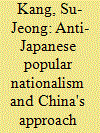

|
|
|
|
|
| Publication |
2013.
|
| Summary/Abstract |
This paper explores the relationship between anti-Japanese popular nationalism and China's approach towards Japan amid Sino-Japanese political tension from 2001 to mid-2006. Among various factors that may affect the relationship, this research focuses on the interaction between the government and the public expressions of anti-Japanese nationalism in China. Throughout most of this period, Sino-Japanese political relations were seriously strained by historical, territorial and other controversial issues, which stirred up anti-Japanese sentiment in China. However, it was only between 2003 and the spring of 2005 that mass anti-Japanese protests were allowed, or at least tolerated, by the Chinese authorities and played a role in Beijing's handling of Japan-related controversies. The paper examines China's domestic political situation during the leadership transition from the third to fourth generation of leaders, which it claims drove the Chinese government's lenient response to popular anti-Japanese protests and enhanced the prospects for popular nationalism to affect the government's approach towards Japan.
|
|
|
|
|
|
|
|
|
|
|
|
|
|
|
|
| 2 |
ID:
122517
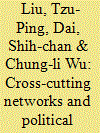

|
|
|
|
|
| Publication |
2013.
|
| Summary/Abstract |
This research examines whether public political participation in Taiwan is influenced by people's interactive relations and social environments. In contrast to the "sociodemographic factor" and "political mobilization" approaches used in previous studies of political participation, this paper's theoretical structure is that of "cross-cutting networks." It analyzes the influence exerted by social network "cross-pressures" on voters' engagement in political activities and their likelihood of voting in the 2010 mayoral elections in Taipei, Kaohsiung, and Taichung cities. The study uses national survey data to test the association between cross-cutting networks and political participation. The methodology adopted includes cross-tabulation analyses, ordered logit model, and logit model. The findings reveal that people in cross-cutting networks involving greater political disagreement are less likely to participate in politics while individuals engaging in homogeneous social interactions and under low-level cross-pressure are predisposed to participate more actively in politics.
|
|
|
|
|
|
|
|
|
|
|
|
|
|
|
|
| 3 |
ID:
122521
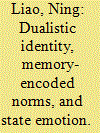

|
|
|
|
|
| Publication |
2013.
|
| Summary/Abstract |
By tracing the origin and evolution of Chinese nationalism, this paper finds that the dialectical relationship between the Chinese "self" and the foreign "other" has provided the cultural-institutional context for the construction of its national identity. The positional change of the Chinese actor in the self-other interaction-resulting from the institutional shift from the tianxia order to the Westphalian system-and the consequent national humiliation have been embedded in the Chinese collective memory and given rise to the consensual norms ingrained in the national identity. Viewed through the lens of political sociology and identity politics, China's tenacious struggle for national rejuvenation can be construed as a social practice guided by these memory-encoded social norms. Due to the protracted and ambivalent nature of the state's purposive action in attaining great-power status on the international stage, the confidence of the resurgent state is compromised by an acute sense of frustration. This identity predicament has engendered a peculiar Chinese state emotion, which has profoundly influenced the in-group members' evaluation and perception of out-group entities and their behavior in the antagonistic intergroup relations.
|
|
|
|
|
|
|
|
|
|
|
|
|
|
|
|
| 4 |
ID:
122520
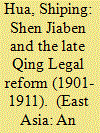

|
|
|
| 5 |
ID:
122518
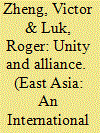

|
|
|
|
|
| Publication |
2013.
|
| Summary/Abstract |
Greater China has been separated and divided for over a century. The reunification of Hong Kong and Macao on the eve of the New Millennium has paved the way for Greater China to reunify as a single economy with a single internationalized currency. History shows that financial and monetary collaborations are essential to the future of Greater China in the global arena. We argue that collaboration might begin with a common board in Hong Kong, Shanghai and Taipei for Greater China enterprises to list and trade in one synchronized market. The common board would also facilitate public and private bonds in support of the infrastructural development and globalization of Greater China enterprises. Due to its established financial market, system and culture, Hong Kong would be the undisputed home of the Greater China Enterprises Board. Financial collaboration would advocate monetary alliance when the Chinese renminbi is fully convertible. When the time comes, the offshore renminbi based in Hong Kong would become the counterpart of the Eurodollar in London. The Asianyuan, as it might be called, would be the truly internationalized and globalized renminbi.
|
|
|
|
|
|
|
|
|
|
|
|
|
|
|
|